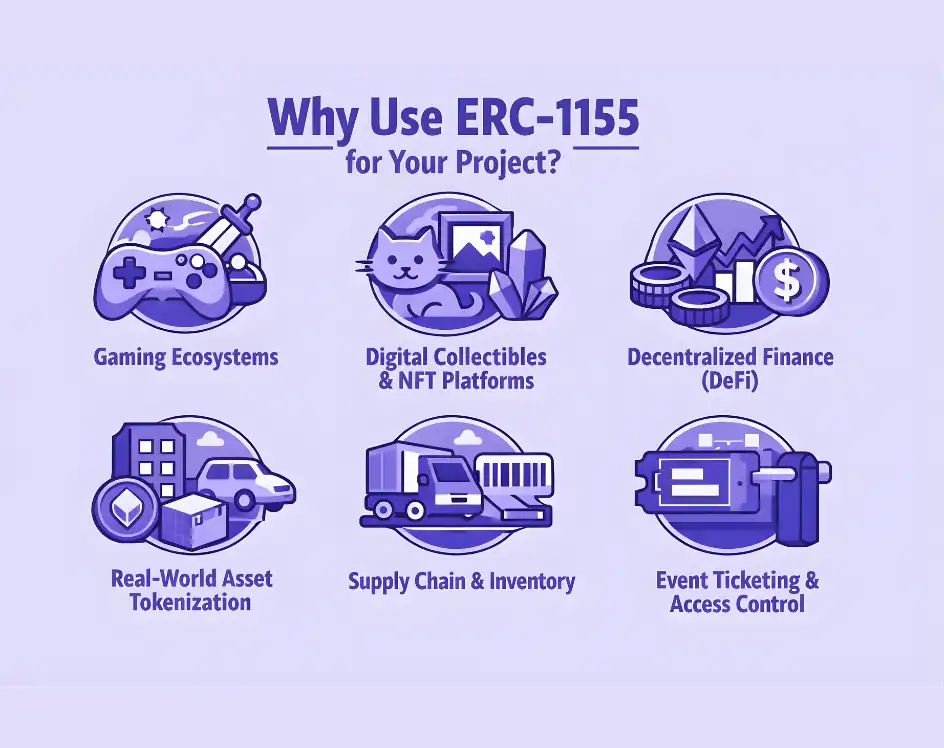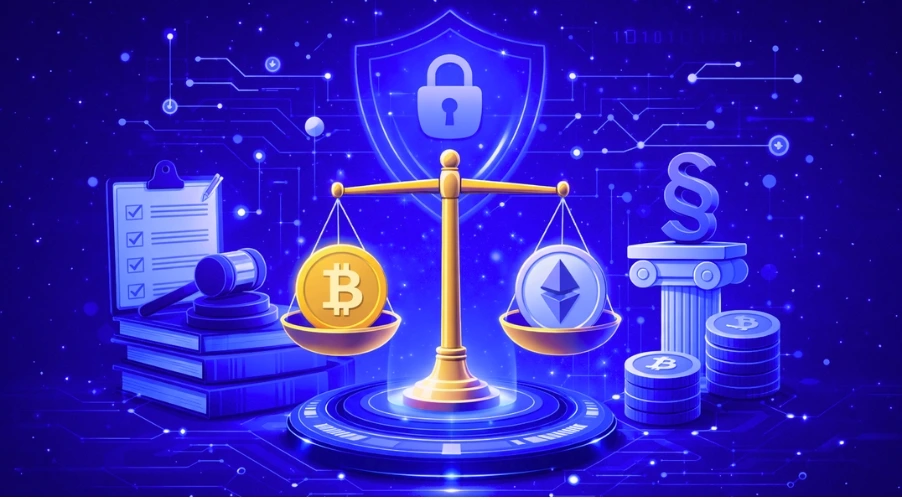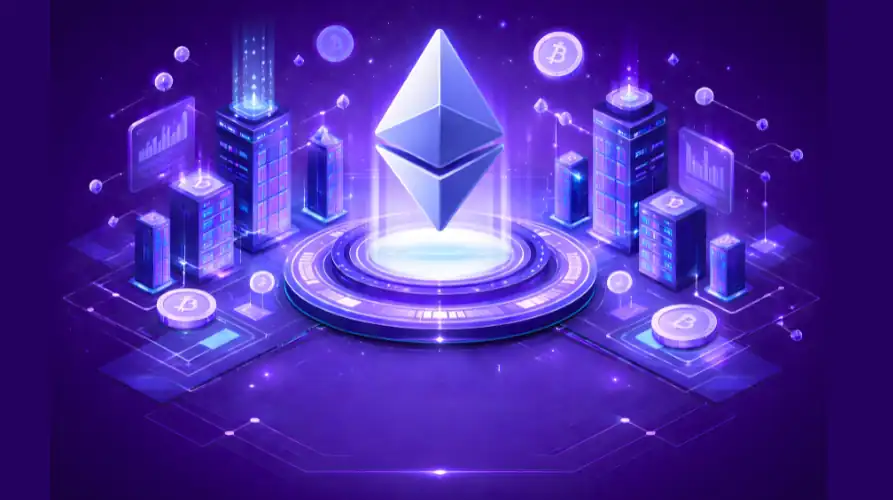ERC-1155 represents a breakthrough in Ethereum token standards, offering unprecedented flexibility by managing multiple token types within a single smart contract. Whether you’re building gaming platforms, NFT marketplaces, or complex DeFi applications, understanding ERC-1155 is essential for efficient blockchain development.
Key Takeaways
- ERC-1155 supports fungible, non-fungible, and semi-fungible tokens in one contract
- Batch transfers and balance queries significantly reduce gas costs
- A single smart contract can manage unlimited token types via token IDs
- One approval grants operators access to all tokens within the contract
- Built-in receiver hooks prevent tokens from being locked in incompatible contracts
- Ideal for gaming, metaverse assets, DeFi positions, and NFT marketplaces
- Metadata uses a flexible URI template for scalable asset management
- Future-ready design enables Layer 2 scaling, cross-chain use, and complex asset systems
What is ERC-1155?
ERC-1155 is a multi-token standard on Ethereum that enables a single smart contract to manage an unlimited number of fungible and non-fungible tokens simultaneously. Introduced through EIP-1155, this standard revolutionizes how developers handle diverse asset types by combining the capabilities of ERC-20 (fungible tokens) and ERC-721 (NFTs) into one unified interface.
The standard’s core innovation lies in its ability to represent any combination of crypto token types—from cryptocurrency-like fungible tokens to unique NFTs and even semi-fungible tokens that transition between states. This consolidation eliminates the need for deploying multiple contracts, dramatically reducing gas costs and simplifying asset management.
How ERC-1155 Differs From ERC-20 and ERC-721
Understanding the distinctions between Ethereum token standards is crucial for selecting the right approach for your project:
| Feature | ERC-20 | ERC-721 | ERC-1155 |
|---|---|---|---|
| Token Type | Fungible only | Non-fungible only | Both + semi-fungible |
| Contract Structure | One contract per token | One contract per collection | Multiple token types in one contract |
| Batch Transfers | No | No | Yes |
| Gas Efficiency | Moderate | High cost per transfer | Highly optimized |
| Balance Tracking | Single balance per address | Count of unique tokens owned | Separate balance per token ID |
| Metadata | Not supported | Per token | Per token ID with URI template |
ERC-721 treats each token as entirely unique with no concept of quantity. If you own five different NFTs, your balance is five distinct items. ERC-1155, however, maintains individual balances for each token ID—you could own 100 units of token ID 3 and 1 unit of token ID 5, all managed efficiently within the same contract.
Core Functions and Features of ERC-1155
At the heart of ERC-1155 lies a collection of powerful functions designed to optimize asset transfers, balance management, and contract interactions, making it a robust crypto token solution for developers seeking efficiency, safety, and flexibility unmatched by earlier token standards.

1. Batch Transfer Operations
ERC-1155’s batch transfer capability allows multiple token transfers in a single transaction, significantly reducing gas costs and blockchain congestion:
function safeBatchTransferFrom(
address _from,
address _to,
uint256[] calldata _ids,
uint256[] calldata _values,
bytes calldata _data
) external;For example, with _ids=[3, 6, 13] and _values=[100, 200, 5], a single transaction transfers 100 tokens of ID 3, 200 tokens of ID 6, and 5 tokens of ID 13 from one address to another.
2. Batch Balance Queries
Retrieve multiple token balances simultaneously, streamlining wallet interfaces and application logic:
function balanceOfBatch(
address[] calldata _owners,
uint256[] calldata _ids
) external view returns (uint256[] memory);3. Universal Approval System
ERC-1155 uses an all-or-nothing approval mechanism through setApprovalForAll. When you approve an operator, they gain permission to manage all your tokens within that contract—not specific amounts or token IDs. This simplification enhances user experience while maintaining security through explicit permission controls.
4. Receive Hooks for Smart Contracts
Contracts receiving ERC-1155 tokens must implement callback functions that execute upon token receipt:
function onERC1155Received(
address _operator,
address _from,
uint256 _id,
uint256 _value,
bytes calldata _data
) external returns(bytes4);This hook enables complex interactions like automatic staking, forwarding, or conditional acceptance based on token type.
5. Safe Transfer Rules
The standard implements strict safety mechanisms to prevent token loss:
- Transfers to contract addresses require the recipient to implement
ERC1155Receiverinterface - The receiving contract must return a specific magic value to confirm acceptance
- Transactions automatically revert if the recipient cannot handle ERC-1155 tokens
- This prevents the common issue of tokens being permanently locked in incompatible contracts
ERC-1155 Token List and Token Types
ERC-1155 accommodates three distinct token categories within a single contract:
Understanding the ERC-1155 Token Standard Architecture
The ERC-1155 token standard operates through a sophisticated yet efficient architecture that separates concerns and optimizes performance:
Token ID System
Each token type within an ERC-1155 contract receives a unique uint256 identifier. Rather than deploying separate contracts, all token types share infrastructure while maintaining distinct properties and supplies. The contract tracks individual balances for each combination of address and token ID.
Metadata and URI Template
ERC-1155 uses a URI template system for metadata. The uri function returns a string containing {id}, which clients replace with the hexadecimal token ID (64 characters, lowercase, zero-padded):
// URI template
https://game.example/api/item/{id}.json
// For token ID 2, clients fetch:
https://game.example/api/item/0000000000000000000000000000000000000000000000000000000000000002.jsonThis approach enables efficient metadata management for thousands of token types without bloating the blockchain.
Smart Contract Efficiency
ERC-1155 achieves superior efficiency by consolidating state management. Instead of maintaining separate contract instances, all token data resides in mapping structures within one contract. This reduces deployment costs by up to 90% compared to deploying individual ERC-721 contracts for each NFT collection.
Why Use ERC-1155 for Your Project?
Choosing the right token standard can significantly impact your project’s cost, performance, and long-term scalability. In today’s evolving coin and token solution ecosystem, ERC-1155 offers compelling advantages that make it a preferred option for modern blockchain applications.
Massive Gas Savings
Deploying a single contract for all token types instead of multiple contracts dramatically reduces deployment costs. Batch operations further minimize transaction fees by consolidating multiple transfers into one blockchain interaction. Users can save 60-80% on gas fees when transferring multiple assets compared to individual ERC-721 transfers.
Simplified Development and Maintenance
Managing one contract instead of many reduces complexity, upgrade overhead, and potential security vulnerabilities. Developers spend less time on infrastructure and more on building features. Contract upgrades and bug fixes only need to be applied once rather than across multiple deployed contracts.
Enhanced User Experience
Users benefit from simpler wallet interactions, fewer approval transactions, and faster asset transfers. The ability to move entire inventories in single transactions improves usability significantly. Instead of approving and transferring each NFT separately, users can bundle dozens of transactions into one.
Future-Proof Flexibility
ERC-1155’s design accommodates evolving project requirements. Add new token types without redeploying infrastructure, support emerging use cases like fractionalized NFTs, and adapt to changing market demands seamlessly.
Practical Use Cases for ERC-1155
ERC-1155’s flexibility enables it to power a wide range of real-world and digital applications. From gaming economies to financial instruments, the standard adapts seamlessly to diverse industry needs.

Gaming Ecosystems
Video games require diverse asset types—currencies, weapons, armor, characters, consumables, and collectibles. ERC-1155 enables developers to manage this complexity efficiently. A single contract can handle both fungible gold coins and unique legendary items, with batch transfers allowing players to trade entire inventories instantly. Popular blockchain games like Enjin and Immutable X leverage ERC-1155 for in-game economies.
Digital Collectibles and NFT Platforms
Art platforms benefit from ERC-1155’s ability to create limited edition collections where some pieces are unique while others exist in small quantities. Artists can mint 1/1 artworks alongside 100-edition prints within the same smart contract framework. This flexibility enables diverse pricing strategies and collector experiences.
Decentralized Finance (DeFi)
DeFi protocols use ERC-1155 for representing multiple asset positions, liquidity pool shares, or derivative instruments within unified interfaces. The standard simplifies complex financial product architectures. Protocols can issue LP tokens, governance tokens, and synthetic assets from a single contract.
Real-World Asset Tokenization
Tokenizing physical assets like real estate, commodities, or equipment benefits from ERC-1155’s flexibility. A single contract can represent fractional ownership shares (fungible) and property deeds (non-fungible), streamlining asset management and transfer processes. This approach reduces administrative overhead and enhances liquidity for traditionally illiquid assets.
Supply Chain and Inventory Management
Track products throughout supply chains using ERC-1155 tokens representing batches (fungible) and individual serialized items (non-fungible). The standard’s batch operations optimize logistics tracking and verification. Companies can monitor product authenticity, track shipments, and manage inventory levels on-chain efficiently.
Event Ticketing and Access Control
Event organizers use ERC-1155 to issue tickets as semi-fungible tokens. Before the event, tickets are fungible and interchangeable. After redemption, they transform into unique commemorative NFTs with specific metadata about the attendee’s experience, seat location, and event moments.
Building ERC-1155 Contracts: A Practical Example
Here’s a simplified implementation of an ERC-1155 gaming items contract:
// SPDX-License-Identifier: MIT
pragma solidity ^0.8.0;
import "@openzeppelin/contracts/token/ERC1155/ERC1155.sol";
contract GameItems is ERC1155 {
uint256 public constant GOLD = 0;
uint256 public constant SILVER = 1;
uint256 public constant LEGENDARY_SWORD = 2;
uint256 public constant HEALTH_POTION = 3;
constructor() ERC1155("https://game.example/api/item/{id}.json") {
// Mint fungible tokens
_mint(msg.sender, GOLD, 10**18, "");
_mint(msg.sender, SILVER, 10**27, "");
// Mint non-fungible token (supply of 1)
_mint(msg.sender, LEGENDARY_SWORD, 1, "");
// Mint semi-fungible tokens
_mint(msg.sender, HEALTH_POTION, 10**6, "");
}
}This contract demonstrates how GOLD and SILVER function as currencies (fungible), LEGENDARY_SWORD as a unique NFT (non-fungible with supply 1), and HEALTH_POTION as consumable items (semi-fungible).
Essential Tools for ERC-1155 Development
Developing secure and efficient ERC-1155 contracts requires the right set of tools and frameworks. These resources streamline development, testing, and deployment while reducing potential risks.
| Tool | Purpose | Key Benefits |
|---|---|---|
| OpenZeppelin Contracts | Audited smart contract library | Battle-tested security, comprehensive ERC-1155 implementation, extension support |
| Hardhat | Development environment | Advanced testing framework, debugging tools, deployment automation |
| Remix IDE | Browser-based development | No installation required, instant testing, integrated debugger |
| Truffle Suite | Development framework | Smart contract compilation, testing, and migration management |
| Ethers.js / Web3.js | Frontend integration | Interact with contracts from web applications |
Best Practices for ERC-1155 Implementation
While ERC-1155 simplifies many aspects of token management, careful implementation is still critical. Following best practices ensures your contracts remain secure, efficient, and compatible with the broader ecosystem.
Security Considerations
- Thorough Auditing: Always audit smart contracts before deployment, especially when handling valuable assets. Professional audits from firms like CertiK, OpenZeppelin, or Trail of Bits identify vulnerabilities.
- Access Controls: Implement role-based permissions for minting and administrative functions. Use OpenZeppelin’s AccessControl for granular permission management.
- Reentrancy Protection: Use OpenZeppelin’s ReentrancyGuard when implementing complex transfer logic. This prevents malicious contracts from exploiting callback functions.
- Input Validation: Verify array lengths match in batch operations to prevent index errors. Check for zero addresses and validate token IDs exist.
Gas Optimization
- Use batch operations whenever transferring multiple tokens to minimize transaction costs
- Cache storage variables in memory during complex calculations to reduce expensive storage reads
- Optimize token ID assignment strategies for efficient storage packing
- Consider using tight variable packing in structs to minimize storage slots
Metadata Management
- Host metadata on decentralized storage (IPFS) for permanence and censorship resistance
- Include comprehensive token attributes in JSON metadata for marketplace compatibility
- Implement URI update mechanisms carefully to prevent unauthorized metadata changes
- Follow OpenSea metadata standards for maximum marketplace compatibility
Common Challenges and Solutions
Despite its advantages, ERC-1155 introduces unique design and integration considerations. Understanding common challenges ahead of time allows developers to mitigate risks and build more robust applications.
Contract Interaction Complexity
Challenge: Applications must handle both single and batch operations, increasing frontend complexity.
Solution: Build abstraction layers that detect operation types and route to appropriate functions. Use libraries like Ethers.js with typed interfaces for type safety. Create wrapper functions that automatically determine whether to use single or batch operations based on input.
Marketplace Integration
Challenge: Not all NFT marketplaces support ERC-1155 tokens.
Solution: Verify marketplace compatibility before launching. Major platforms like OpenSea, Rarible, and Blur now support ERC-1155, but specialized marketplaces may require custom integration work. Consider implementing marketplace-specific metadata formats.
Token ID Management
Challenge: Tracking which token IDs represent which asset types can become confusing as projects scale.
Solution: Maintain comprehensive documentation, use descriptive constant names in smart contracts, and implement getter functions that return token metadata including type classification. Create off-chain databases that map token IDs to human-readable names and categories.
ERC-1155 vs ERC-721: When to Choose Each
Choose ERC-1155 when your project involves multiple token types, requires batch operations, or needs to optimize gas costs across many assets. It’s ideal for gaming, complex NFT ecosystems, and applications managing diverse asset portfolios.
Choose ERC-721 when you’re creating purely unique NFTs with no fungible elements, need maximum marketplace compatibility, or when the project involves a single collection of entirely distinct items. ERC-721 remains the standard for traditional NFT art collections and one-of-a-kind digital assets.
Future of ERC-1155
The ERC-1155 token standard continues evolving as the Ethereum ecosystem matures. Emerging trends include integration with Layer 2 scaling solutions for even lower costs, cross-chain bridges enabling ERC-1155 tokens on multiple blockchains, and sophisticated DeFi composability where ERC-1155 tokens serve as collateral or liquidity positions.
As blockchain gaming and metaverse platforms expand, ERC-1155’s efficiency advantages position it as the preferred standard for managing diverse digital assets. The ability to handle complex asset hierarchies within single contracts aligns perfectly with the needs of immersive virtual worlds and interconnected digital economies.
Innovations like dynamic NFTs, cross-game asset portability, and fractional ownership models are increasingly leveraging ERC-1155’s flexible architecture. The standard’s adoption continues growing as developers recognize its advantages for building scalable, cost-effective blockchain applications.
Conclusion
ERC-1155 represents a significant advancement in Ethereum token standards, offering unmatched flexibility and efficiency for managing diverse asset types. By consolidating fungible tokens, NFTs, and semi-fungible tokens into a single smart contract, it reduces costs, simplifies development, and enhances user experiences.
Whether you’re building gaming platforms, NFT marketplaces, DeFi protocols, or tokenizing real-world assets, ERC-1155 provides the robust foundation necessary for scalable blockchain applications. Its batch operations, safety mechanisms, and extensible architecture make it the optimal choice for projects requiring sophisticated asset management on Ethereum.
Understanding and implementing the ERC-1155 token standard positions developers to build the next generation of blockchain applications efficiently and effectively. As the ecosystem evolves, ERC-1155’s advantages become increasingly crucial for projects demanding flexibility, cost-efficiency, and seamless user experiences.
Frequently Asked Questions
ERC-1155 supports multiple token types within one contract, including fungible, non-fungible, and semi-fungible tokens. ERC-721 only handles unique non-fungible tokens separately. ERC-1155 enables batch transfers, reducing gas costs significantly.
Yes, major NFT marketplaces like OpenSea, Rarible, and Blur fully support ERC-1155 tokens. These platforms recognize both fungible and non-fungible variants within ERC-1155 contracts, enabling seamless trading and discovery.
Batch transfers consolidate multiple token movements into one transaction, eliminating redundant blockchain operations. Instead of paying transaction fees separately for each asset, users pay once regardless of quantity, saving 60-80% on gas.
Semi-fungible tokens start as interchangeable units but can transition to unique states. Common examples include event tickets that become commemorative NFTs post-event or gaming consumables that transform after use.
Both standards implement robust security when properly coded. ERC-1155 includes safe transfer rules preventing token loss in incompatible contracts. Security depends on implementation quality, auditing thoroughness, and following best practices.
Direct conversion isn’t possible as they’re different contract standards. However, you can create wrapper contracts that lock ERC-721 tokens and mint equivalent ERC-1155 representations, enabling cross-standard functionality.
OpenZeppelin provides audited contract templates, Hardhat offers comprehensive development environments, and Remix IDE enables browser-based coding. These tools streamline ERC-1155 development with testing frameworks and deployment utilities.
Reviewed & Edited By

Aman Vaths
Founder of Nadcab Labs
Aman Vaths is the Founder & CTO of Nadcab Labs, a global digital engineering company delivering enterprise-grade solutions across AI, Web3, Blockchain, Big Data, Cloud, Cybersecurity, and Modern Application Development. With deep technical leadership and product innovation experience, Aman has positioned Nadcab Labs as one of the most advanced engineering companies driving the next era of intelligent, secure, and scalable software systems. Under his leadership, Nadcab Labs has built 2,000+ global projects across sectors including fintech, banking, healthcare, real estate, logistics, gaming, manufacturing, and next-generation DePIN networks. Aman’s strength lies in architecting high-performance systems, end-to-end platform engineering, and designing enterprise solutions that operate at global scale.






